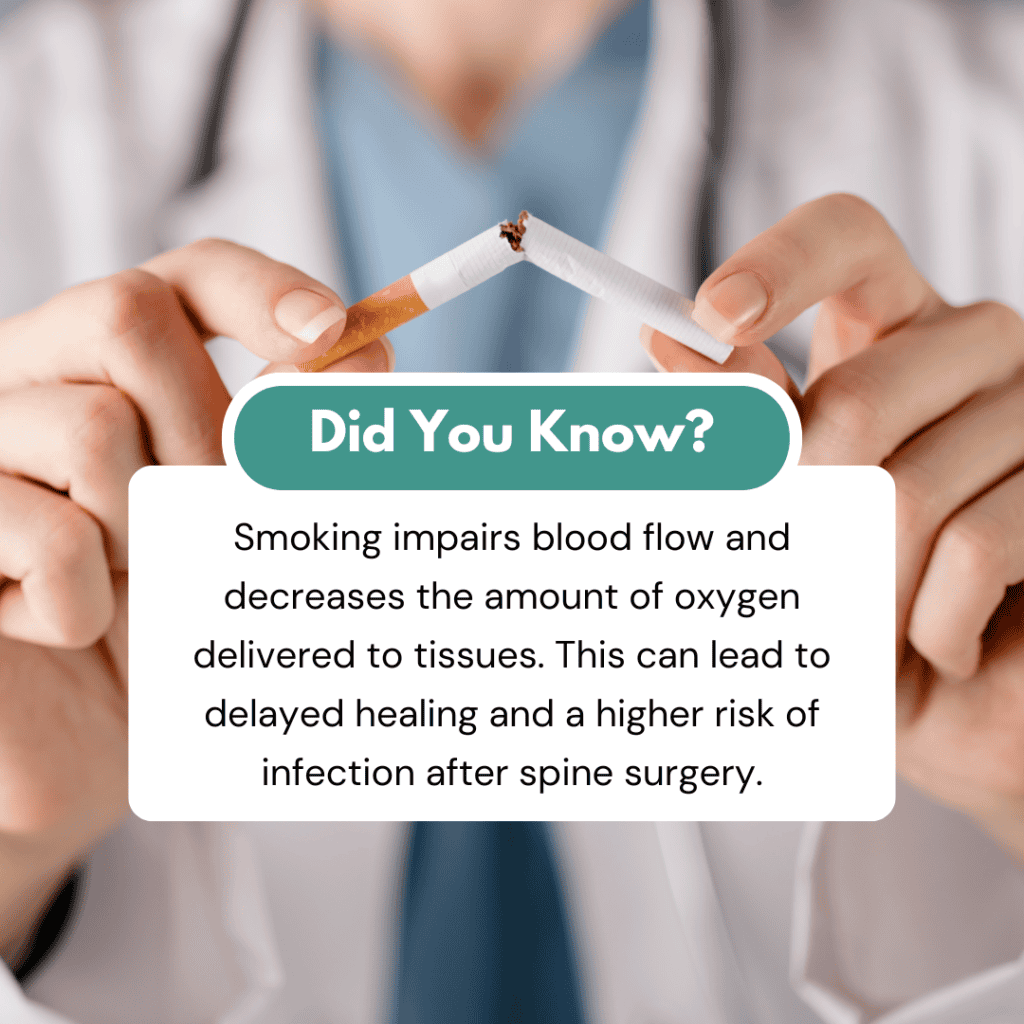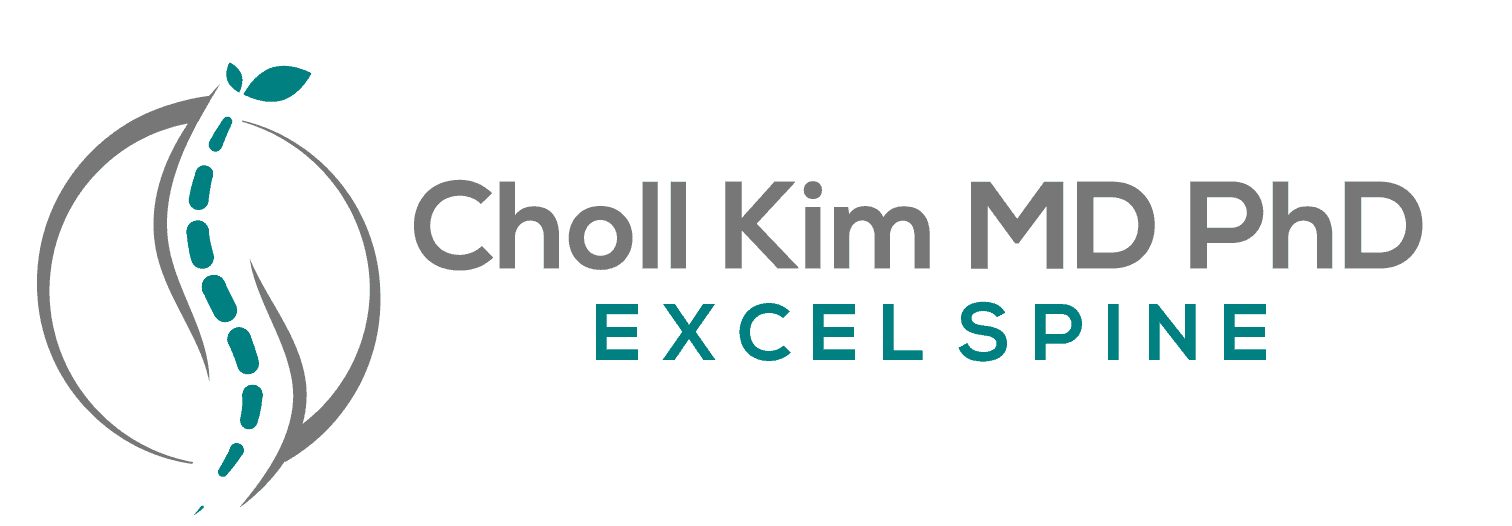
Introduction
Smoking has well-documented detrimental effects on the body, impacting almost every organ and system. However, its impact on spine health and surgery outcomes is often overlooked. I frequently discuss with my patients the impact smoking has on spine health and surgery outcomes. I want to share some insights on how smoking can affect your spine and what you can expect if you continue smoking versus quitting before surgery. My goal is to help you make informed decisions for your health and well-being.

1. Disc Degeneration: Nicotine and other harmful chemicals in cigarettes accelerate the degeneration of intervertebral discs. These discs act as cushions between the vertebrae, and their deterioration can lead to chronic back pain and conditions such as herniated discs.
2. Bone Density Reduction: Smoking affects bone mineral density, making bones more brittle and prone to fractures. The spine, being a central structural component, is particularly vulnerable to such damage, increasing the risk of conditions like osteoporosis.
3. Increased Inflammation: The toxins in cigarette smoke contribute to systemic inflammation, which exacerbates spinal conditions. Chronic inflammation can lead to increased pain and discomfort, further impairing spinal health.
4. Impaired Immune Function: Smoking weakens the immune system, making the body less effective at fighting off infections. For spinal health, this means a higher risk of infections in the spinal region, complicating both the condition and potential surgical outcomes.
How Smoking Affects Surgery Recovery
1. Delayed Healing: One of the most significant impacts of smoking on surgery is delayed healing. Nicotine constricts blood vessels and reduces the flow of oxygen and nutrients essential for wound healing. This can prolong recovery times and increase the risk of complications.
2. Higher Risk of Infection: As smoking weakens the immune system, it also heightens the risk of postoperative infections. Infections can lead to severe complications, including the need for additional surgeries, extended hospital stays, and in some cases, permanent damage.
3. Impaired Bone Fusion: For spinal surgeries involving bone graft or fusion, smoking presents a major challenge. Nicotine interferes with the body’s ability to produce new bone cells, which is crucial for successful fusion. This can lead to failed surgeries and the need for further intervention.
4. Increased Pain: Smokers often experience higher levels of pain post-surgery compared to non-smokers. This can be attributed to the reduced effectiveness of pain management strategies in smokers and the ongoing inflammatory processes exacerbated by smoking.
5. Poor Long-Term Outcomes: Overall, smokers tend to have poorer long-term outcomes following spine surgery. This includes a higher likelihood of needing additional surgeries, experiencing chronic pain, and reduced overall quality of life.
Benefits of Quitting Smoking Before Surgery
1. Enhanced Healing and Recovery: Quitting smoking before surgery can significantly improve blood flow and oxygen delivery to tissues, facilitating faster and more effective healing. This can reduce the length of hospital stays and improve overall recovery experiences.
2. Lower Risk of Complications: By quitting smoking, patients reduce their risk of postoperative complications, including infections and impaired bone healing. This leads to a smoother recovery process and better surgical outcomes.
3. Improved Bone Health: Stopping smoking improves bone density and overall bone health, which is crucial for patients undergoing spinal surgery. Stronger bones enhance the success rates of procedures involving bone grafts and fusions.
4. Better Pain Management: Non-smokers often report better pain control post-surgery. By quitting smoking, patients can experience lower levels of pain and discomfort, leading to a more comfortable recovery.
5. Long-Term Health Benefits: Beyond the immediate surgical outcomes, quitting smoking offers numerous long-term health benefits. These include a reduced risk of chronic diseases, improved respiratory and cardiovascular health, and overall better quality of life.
Conclusion
The negative impact of smoking on spine health and surgery outcomes cannot be overstated. From delayed healing and increased infection risks to impaired bone health and higher pain levels, smoking complicates every aspect of spinal surgery. Quitting smoking enhances your body’s ability to heal, lowers the risk of complications, and ultimately leads to better long-term health. If you’re preparing for spinal surgery, taking the step to quit smoking is not just beneficial—it is one of the most important decisions you can make for your health.
FAQs
How long before surgery should I quit smoking? It’s recommended to quit smoking at least 4-6 weeks before surgery to allow your body time to improve blood flow and oxygen delivery.
Can smoking after surgery affect my recovery? Yes, smoking after surgery can impede healing, increase the risk of complications, and lead to poorer long-term outcomes.
What resources are available to help me quit smoking? There are various resources, including nicotine replacement therapies, prescription medications, counseling, and support groups that can aid in quitting smoking.
Will my surgeon still operate if I smoke? Many surgeons strongly advise quitting smoking before surgery due to the increased risks and complications associated with smoking.
How does smoking affect anesthesia during surgery? Smoking can affect how your body metabolizes anesthesia, potentially leading to complications during surgery and recovery.
